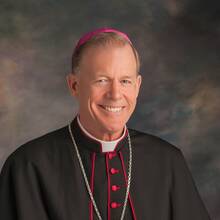When Jesus “goes public” with his ministry in Luke’s Chapter 4, his first words are about his social mission. Jesus stands before the crowd and announces that he has been anointed to “bring good news to the poor, to proclaim liberty to the captives, sight to the blind, and to set free the oppressed.” He reinforces this mission again and again in the Gospels and makes it clear: This is our mission, too. In Matthew’s Chapter 25, Jesus not only commands us to care for “the least of these” but states the criteria for inheriting the kingdom of God is feeding the hungry, caring for the sick and welcoming the stranger.
This has been the church’s mission for 2,000 years, so we ought to take any diminishment of it very seriously. The recent announcement of major layoffs at the department of the U.S. bishops dedicated to the social witness of the church undermines that mission.
I have been a member of the U.S. Conference of Catholic Bishops for more than a quarter century. I have been proud of the way the bishops of the United States have carried out our mission by standing with the poor, working for justice and pursuing peace. We have done so by sharing and applying the teaching of the Gospel and the principles of Catholic social teaching as pastors, teachers and leaders in our Catholic community of faith.
Unfortunately, with all due respect to the leadership, I believe the U.S.C.C.B. is quietly taking extraordinary actions that curtail our sacred social mission. My purpose in writing this column is not to attack anyone, but to assure Catholics that many, many bishops are advocating for robust justice and peace work within the conference. Furthermore, I hope and pray the leadership of our conference will be more transparent about what was actually done and that we will find meaningful ways to reaffirm the church’s work for the poor and for justice.
In mid-June, U.S. bishops gathered in Louisville for our biannual assembly. The bishops’ anti-poverty program, the Catholic Campaign for Human Development, was on the agenda for discussion due to the substantial financial issues the campaign faces. After the bishops’ vocal support of the program at the meeting, the president of the U.S.C.C.B., Archbishop Timothy Broglio, said that “the bishops’ ongoing commitment to the vital work of fighting poverty was clear.”
Two weeks later, we learned in the media that the U.S.C.C.B. terminated at least seven program staff from the Department of Justice, Peace and Human Development. We know that additional positions were eliminated through resignations and transfers. This department oversees the Catholic Campaign for Human Development, but its reach extends far beyond it into the areas of education, outreach and advocacy for the church’s social mission. Yet most of my brother bishops and I have received no financial justification for the cuts. After my 26 years as a bishop, I am appalled that the U.S.C.C.B. would undermine a vital function without a process involving consultation and transparency.
After the bishops’ strong support of our social mission two weeks prior, how did this happen? Who decided this? Why the lack of transparency? What is the total staff capacity—all positions—that is being eliminated and what will remain? What is the financial picture that justifies these cuts, and why are the cuts focused primarily on the justice and peace work of our conference?
Most important, what will these cuts mean for our social mission? The Department of Justice, Peace and Human Development helps our conference bring Catholic social doctrine alive in the Catholic community through education and outreach. Its staff helps the church advocate for the poor and vulnerable both in the United States and abroad. They help the whole church raise our voices on the many urgent, moral issues facing society—from the conflicts in Gaza and Ukraine to domestic issues of hunger, maternal health and air pollution. How will these dramatic resource reductions impact this vital work?
This is a tumultuous time, and several bishops have raised questions and voiced alarm about these actions and their impact on our commitment to the church’s social mission. In these times, I pray that we keep Jesus’ example and words at the center of all our actions. May all of us Catholics follow Jesus ever more closely and faithfully carry out his mission. I pray that we, like Jesus, stand in the public square and boldly proclaim good news for the poor.







